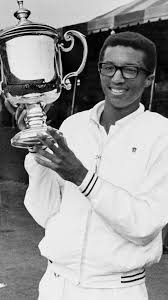
Introduction
Arthur Ashe, a trailblazing tennis player and civil rights activist, continues to inspire generations long after his passing. His contributions to the sport of tennis and his tireless work for equality reflect the significance of his legacy in both athletics and social justice. As one of the first African Americans to achieve major success in tennis, Ashe’s journey remains relevant in today’s discussions surrounding diversity and representation in sports.
Ashe’s Career Achievements
Born on July 10, 1943, in Richmond, Virginia, Arthur Ashe became the first African American man to win the US Open in 1968, a feat that marked a pivotal moment in tennis history and contributed to the breaking down of racial barriers in the sport. He went on to win three Grand Slam titles: the US Open (1968), the Australian Open (1970), and Wimbledon (1975). Ashe’s graceful style of play and sportsmanship earned him the respect and admiration of both fans and fellow players alike.
Advocacy and Activism
Outside the court, Ashe was a passionate advocate for civil rights and social justice. He used his platform to address issues such as racial inequality, AIDS awareness, and global humanitarian efforts. In 1985, he was diagnosed with AIDS, a condition he contracted from a blood transfusion. Following his diagnosis, Ashe became an outspoken advocate for AIDS education and prevention, striving to eliminate the stigma surrounding the disease. His bravery and openness about his illness brought much-needed attention to the crisis and inspired many to join the fight against the epidemic.
Honours and Legacy
In recognition of his achievements and contributions, Ashe was posthumously awarded the Presidential Medal of Freedom in 1993. The Arthur Ashe Courage Award, presented annually at the ESPY Awards, is named in his honour, celebrating athletes who have shown courage and championed social change. Moreover, the Arthur Ashe Foundation for the Defeat of AIDS, established in 1992, continues to uphold his commitment to education and advocacy in health-related issues.
Conclusion
Arthur Ashe’s legacy transcends tennis; it embodies the spirit of resilience and activism in the face of adversity. As discussions about equity, representation, and health continue to unfold in today’s society, Ashe’s life serves as a powerful reminder of the impact one individual can have on the world. His story invites all of us to strive for justice and equality not only in sports, but in every aspect of life. As we remember Ashe, we are reminded of the responsibility we have to carry forth his mission of inclusivity and advocacy for those who are voiceless.
You may also like

The Enduring Legacy of Cliff Richard

Kenny Logan: The Journey of a Rugby Star

The Life and Career of Pauline McLynn
SEARCH
LAST NEWS
- Remembering Wendy Richard: The Promise to Co-Star Natalie Cassidy
- How Did Anglian Water Achieve an ‘Essentials’ Rating for Mental Health Accessibility?
- Shai Hope Leads West Indies in T20 World Cup Clash Against South Africa
- What We Know About Weston McKennie: Future at Juventus and Past at Leeds
- What We Know About the Upcoming Live Nation Antitrust Trial